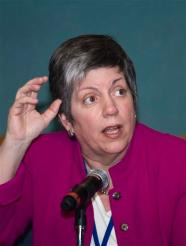
|  |  |  Americas & Beyond | April 2009 Americas & Beyond | April 2009  
Homeland Security Boss Says Cartels Under Pressure
 Eileen Sullivan - Associated Press Eileen Sullivan - Associated Press
go to original


| | U.S. Homeland Security Secretary Janet Napolitano attends a press conference in Cuernavaca, Mexico, Thursday, April 2, 2009. The Obama administration's top cops and their Mexican counterparts are looking for ways to stop arms smuggling across the border as well as new strategies for fighting the drug cartels that have fueled violence in both countries. (AP/Claudio Cruz) |  |
Laredo, Texas — Homeland Security Secretary Janet Napolitano says strategies outlined with Mexican officials this week will put warring drug cartels in a vice.

At a border crossing facility near the Rio Grande River, Napolitano said U.S. and Mexican officials reached agreement on several ways to stop the illegal flow of guns and drugs between the two countries.

Napolitano said beefed up border inspections, drug- and gun-sniffing dogs, more information-sharing and improved surveillance will "operate almost like a vice" on the cartels.

She cited recently seizures of cash and guns as an example of what the two governments can do. Since October, Border Patrol officers have seized more than $50 million in U.S. currency, 641 firearms and nearly 125,000 rounds of ammunition.
In their effort to stop the illegal flow of guns and drugs between U.S. and Mexico, officials from the two countries are considering changes to extradition laws to ensure that offenders get the greatest punishment possible.

The proposal emerged from three days of discussions in which U.S. Attorney General Eric Holder said "there have been breakthroughs" on how to combat drug cartels along the border.

Holder and U.S. Homeland Security Secretary Janet Napolitano met Friday with Mexico President Felipe Calderon and other high ranking Mexican officials to discuss how to detect weapons, drugs and bulk quantities of cash at border crossings.

The discussion also focused on coordination between the Mexican navy and the U.S. Coast Guard to intercept offshore smugglers.

Homeland Security spokesman Sean Smith said the U.S. agreed to begin training dogs to work with Mexican handlers. At present, canine units are credited with detecting about 60 percent of the cash, guns and drugs intercepted along the southeastern U.S. border.

Before the meeting with Calderon, Holder told The Associated press that officials are looking at their extradition laws and considering ways to ensure that cartel members and associates are prosecuted in locations where they face the toughest penalties.

"Which way are they going to go? Are they going to stay here? Go there?" Holder said. "We frequently have them charged in both countries, so the question then becomes where can you get the greatest sentence? Where can you have the greatest impact."

The threat of cartel violence is forcing a new approach to border concerns.

The two countries are considering sending more vetted Mexican law enforcement officials to the U.S. to work on U.S. law enforcement investigations into the drug cartels' operations.

The Obama administration has already committed nearly 500 more law enforcement officers to the southwest border, some of whom will be checking vehicles leaving the U.S. and going to Mexico for cash and weapons.

On Thursday, Immigration and Customs Enforcement officials in Frio County, Texas, found nearly $122,000 in cash and weapons, including 10 live hand grenades stashed in a car. The car, heading south toward Mexico, was pulled over for speeding.

Two U.S. citizens have been arrested and are awaiting charges, according to a law enforcement official, who requested anonymity because the charges have not been announced.

After a conference with U.S. officials Thursday, Mexican Attorney General Eduardo Medina-Mora said more meetings are needed to develop plans to bring warring drug cartels under control along the border.

Mexico plans to begin checking 10 percent of the vehicles entering the country from the U.S. for illegal weapons and will more closely check outgoing vehicles for drugs and money, Medina-Mora said.

The new vehicle inspection measures are part of Mexico's overall $1.4 billion modernization of border customs and crossing points, he said. The first such vehicle checks are already being carried out in Matamoros, across the border from Brownsville, Texas.

There have been about 1,600 drug-related killings in Mexico in the first three months of this year, about 25 percent less than during the last three months of 2008, Mexican officials say. The government says violence has decreased in border cities like Ciudad Juarez after thousands of additional army troops were sent there earlier this year. |

 |
|  |



